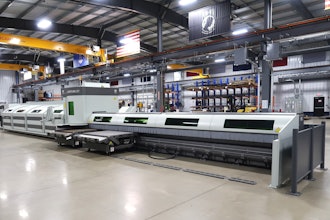We live in a time of a globalized economy—no one knows this better than those in manufacturing. With competition literally rising from the smoke stacks in China and India, among a bevy of other countries, there is no doubt that most of what’s sold in America is longer made here. And as we continue (or stop, as we have recently) to consume, we’re perpetuating a damaging cycle: American jobs are being shipped overseas because of the shoddy economy, and yet we are unable to fix said economy because the money we spend on those foreign-made goods doesn’t stay within our borders.
I know IMPO’s readers would prefer that all (or at least a vast majority of) the products—whether it’s food, toys, electronics, or even cars—were made right here in the U.S., managed by companies headquartered in one of our major cities. In this ideal world, an honest manufacturing job could be found almost anywhere, and one could earn a good salary for his or her work. Even better, the money consumers spend would get turned right around into making better products and producing more jobs—a cycle that’s just about the opposite of the contemporary reality. But this utopian vision of American manufacturing has long since passed. It’s simply not in the cards anymore.
All this brings me to a simple question about the origins of the products we buy. Would you rather buy a product that is American-managed, yet built overseas, or a product that is managed from overseas, yet built in America?
I’ll use cars as an example, since the automotive industry is almost synonymous with manufacturing. Let’s just pretend there isn’t any middle ground here, even though we both know automaking isn’t a simple equation of either/or. You have two choices: 1) buy from company A, which is headquartered in Atlanta but builds their cars in Mexico, using parts from Indian and Chinese supplies; or 2) company B, which is headquartered in Osaka, Japan, and builds a fleet of vehicles in Mississippi using parts from Ohio and Michigan.
Each side seems to be a Catch-22 with limited benefits. Take the first choice. According to a recent article from CNN, most of the long-term benefits for America—like job creation—occur when one buys from company A, regardless of where the vehicle is actually made. With more funds being channeled to the corporate headquarters in Atlanta, the company is better able to produce superior products and reel in more employees. So while a great number of foreign workers are getting paid for A’s vehicles, the aggregate benefit still lies within our borders.
But take the opposite side of the coin. When you buy a vehicle from company B, a chunk of your money leaves the U.S. for Japan, where it helps create more corporate jobs for the citizens of Osaka—definitely not ideal when the American economy needs all the help it can get. But at the same time, part of your dollar goes straight to hard-working Americans, like the people at Hyundai’s Montgomery, Ala. plant. In a sense, you’re paying for that working class that helped bring America to its international status in the last century.
But I’m not here to make any arguments—I’m just curious to know what IMPO’s readers think. It comes down to a simple, yet almost impossible decision—between the American worker and the American corporation. With all other factors leveled out, would you rather purchase a vehicle managed from America but made overseas, or vice versa?
Yes, I made this difficult on purpose. Truth is, the decision to buy a car nowadays isn’t this cut-and-dry—there’s things like safety ratings, price, and fuel economy to think about. But the core issue here is that we, as a country, need to come to terms with a globalized economy, and we have to learn how to be consumers in world where a single product might hail from three different continents, excluding our own. It’s our ideology that matters right now, even when a normally complex issue is dumbed down like this. The way we think about this problem right now will have a major impact in how we approach the issue of rescuing American manufacturing in the next 5 or 10 years.
So share your thoughts with me at [email protected], and let me know if we can reproduce your comments—anonymously or with only a first name attached—on this very page. I look forward to the discussion.
|
Comments: James I believe our national security is actually a stake here. If we can not make our on parts for weapons systems for example, we risk being cut off at any time from parts. We are already at risk wherein we are single sourcing products outside of our country already. I believe that the playing field should be kept level at all times. Third world countries that can produce goods cheaper than we can should be taxed at a level to bring the cost up to what it would cost to make it here. Corporations should be penalized for jobs and headquarters set up outside the USA. Is this protectionism? Your damn right it is. Protecting the national security of our country by maintaining the manufacture capacity to supply our own needs in most all products so we can never held hostage over manufactured goods.
Donald At least in part my feelings are: we are better to (using your example) buy company "A's" product that is managed here. And, this is where I see US manufacturing moving towards as our economy changes direction. There are a couple issues here that are forcing manufacturing to move in the direction it is currently going. Labor in developing countries is less expensive for the short term. (Short term, because once these developing countries economies become manufacturing-based, wages tend to rise very rapidly as we are currently starting to see in China.) Longer term US manufacturing will move off-shore in part due to labor organizations unwillingness to work with manufacturing companies so they can compete globally, like the GM example you used. Secondly, it is the current political trend in the US to be the first country to put meaningful "greenhouse" emissions caps on our manufacturing industry. This is similar to what was proposed by the EU but never implemented due to the major negative impact it would have of Europe's manufacturing sector. With this "cap-and-trade" legislation on the US horizon many companies are going to quickly move manufacturing operations outside the US borders.
Douglas Having lived in Hong Kong, Manila, England and the US, employed both in the social service field for years and now in the small family business of manufacturing, my experience tells me I am first a consumer, regardless of country of origin. I am secondly a capitalist subscribing to a culture of "work hard" moves us forward to provide for our next generation. Make as much money as possible, be innovative, competitive, do not look back. In this global economy, I appreciate the options to buy from any where while at the same time dread the cheap labor market that exists overseas. Our relatively short history reminds me, as a nation we depended largely on cheap labor, namely slave and child, before our government and labor unions intervened. Have we changed continents to avoid that appearance in our greed to consume and grow rich at the same time, creating only jobs that cater to our insatiable desire for bigger, better and more? I would enjoy an enforcement of our mandated minimum wage rate for all foreign workers on goods imported for our consumption knowing it would drastically reduce my personal choices on the shelf.
Wolf Your argument is flawed for both cases. The real issue and advantage is to do something of value that is not easily duplicated. American manufacturing has given away a lot of hard won knowledge. We are going through a renormalization. If we drop our superior attitude we will quickly see there is an increasing level of skilled labor supply and we have become very efficient at manufacturing. Therefore, as the renormalization continues the differential wage between manufacturing and service will continue to decrease. This renormalization will also hold buying power down, which will continue to mitigate inflation. Further, the advent of computer systems has reduced the need for the number of middle management. How then is the corporate employment benefit derived? The greatest power corporations have is not in the employment they generate, but in how they allocate resources based on their business return. Further the skilled talent pool is increasing rapidly, which will compress wage differential and drive the population purchasing power toward some global average. Although I am a supporter of manufacturing our competitive strength is no longer based on manufacturing activity. Today if one is in manufacturing one has to deliver quality or one is not in business. It really does not matter from a product perspective where the product is made. What really counts is, does a company make a product that can’t be duplicated for legal or knowledge based reasons. For longer term business security it is more important than ever to have a knowledge based competitive advantage. Baring some major event we will continue to normalize globally. As this occurs the only true competitive edge is to create value doing something that is not easily duplicated. Without such an advantage the pressure will be on as producers of known technologies, products work to undercut one another.
Mike K. I would choose option B. We need to get money to the hard working Americans—NOW. Those parts need automation, fixtures, and tooling, which would also be built here. Then there's maintenance and other overhead. Bottom line: WE GET PAID. I don't liked it and would prefer it be designed and built here but the simple fact is IT DOESN'T PAY to invest in companies that manage. Where does the money go? Not in my pocket or yours. The days of Reagan trickle down economics is gone and I'm sad as well as mad about it. The U.S. gets tax dollars that they give to bankers for "bailouts". What good does that do for us? Does it lower groceries costs? How about lower fuel prices? The employers have been putting pressure on employees for a long, long time, forcing us to operate like private contractors. Not so long ago you would not have ever seen engineering jobs as "temps" or working for a mere "pittance" as contractors. Its "pitiful" and that was before the recession. This is the result of the "MBA Apocalypse" after 9-11. The years that followed were bountiful for anyone involved in outsourcing. The employees were thrown a bone or two while employers really cleaned up. Gradually the house of cards was being built right in front of us and we did nothing. I saw this all coming. I, and many others, whined and complained but nobody cared. Everyone was happy with their SUVs AND LARGE 401Ks. Well, you don't see many Hummers on the road these days and the 401Ks are large only for the insiders in Washington and their banker buddies. Its all about MANUFACTURING, it always has been and always will. That is what will make China the leader of the world and much sooner than later. We gave it away, all the hard work all the ideas funneled right to a Communist country, soon to be superpower. Funny, I recently read a story where someone complained that we, the American public, couldn't handle paying more for goods and services here in our own country. First I would answer that we are actually paying more for many inferior products especially at the lower end and how did we exist for so long before? Now we get Clinton and NFTA, Bush/Cheney with their war mongering, Haliburton, Blackwater and the like? The American public is very resilient but never since the great depression has a series of events brought us to our knees and even with that we are lied to and in denial at the same time. Right before our eyes we as nation have transformed from the 800 pound gorilla pounding our chest, to the lowly bananna to be eaten at will.
John The reason we became a major importer was the strength of our middle class as Super-Power Consumers. Our leaders assumed that with our technical prowess, we could profit by exporting our advanced technology. Unfortunately that only works as long as the rest of the world does not advance. Now we are not only losing our manufacturing jobs, we are now losing our technical, engineering and skilled labor positions. We lost entire industries, such as the bulk of ship building and machine tool industry, worse, we have lost an entire generation of actual manufacturing knowledge. In other words, if we needed to produce ships, or machine tools, we simply don’t have enough people who know how to do it. To paraphrase Star Trek, we don’t have Jordi to “Make it go.” I used to be an importer and spent much of my time in the Orient. What you first observe is the absence of American Made products. I’ve spent as long as three weeks at a time in Korea, and have not seen a US made car. Around Chicago you can’t go three minutes without seeing five Korean autos. Our leaders from both parties have evangelized about the benefits of free trade. Yet our trading partners find ways around the GATT agreements to their own advantage. The reason the Chinese purchased so much of our National Debt, is solely because we transferred our wealth into their coiffeurs. I recall when old man Walton extolled the virtue of Buy American, now Wal-Mart has provided the Communist Chinese with enough funds to modernize their military. All so we can buy stuff for twenty to thirty percent less, than if it were produced in America. For which I am equally as guilty as the rest of us. Having once been an advocate of lazier faire trade, I no longer see how it is benefiting America. One last observation that you did not hit on is innovation. Again, our leadership believes that we can design and engineer half way around the world from the actual manufacturing. My experience has been that actual innovation occurs on the shop floor, by the machines. There is truth in the statement that “Necessity is the Mother of Invention.” The new designs, patents, copyrights are coming from where the machines are located. Is it as irreversible? No. But it will take national leader with a vision and political guts to find a new direction that will keep manufacturing in the United States.
Mike C. The world's economies are so interconnected that generally what is good for the world economy is good for the US economy and vice versa. So, both cases are good for both the world economy and the US economy. But thinking of situations like the one proposed as 'us or them' situations is dangerous and promotes an atmosphere of protectionism, which is the worst thing possible for the US economy and the world economy. If you want more jobs in the US at all levels, more successful companies in the US, and an increase in GDP, then the key is a free international flow of capital and demand. By the way, not all companies manufacture outside of this country to sell to people in this country. I work for a company that manufactures in the US and sells predominantly outside of this country in regions like China and India, bringing lots of tax money back to this country and employing hundreds of people in this country including manufacturing. So be careful of companies like mine and many others like it when restricted trade and protectionism are being discussed.
Dimce "Death to American Made" means death to our economy. There is no economy without the manufacturing sector—it is the bases for everything else. If we can make good and profitable products for Japanese and German companies there is no reason to conclude that we cannot do the same for the American companies. The difference is the profit margins. American companies goal is maximized profit—not reasonable profit—but maximized. In today's world this motto is out-dated. The physical challenges that today's world is going through cannot sustained economy based on maximized profit. The sooner we realize this the better it will be for all of us.
John My real problem is that we have a government that is not addressing the issues. Most favored nations status for 1.3B chinese folks here at home just hurt the unskilled workers here in this country. I do not believe in protectionism but our tax structure, our legal structure is such that companies are almost forced out. Manufacturing goes to the place where it gets the best deal and helps them compete. It seems as though our government heads live in another world. Industry flees and nothing is even acknowledged. It is very frustrating to watch.
Carl Fifteen years ago, I was against foreign manufacturers coming here and setting up shop, with profits going back to the respective companies country of origin. This was especially so when government subsidies ( tax abatement, infrastructure improvements ) went into the getting the manufacturer to locate in their state. Case in point, when Subaru and Isuzu jointly built a plant in nearby Lafayette, IN. The original package included $40,000,000 in tax abatement and improvements for what was at the time 1,200 jobs. While the wages were excellent for the area, in essence it seemed on the surface that was a high price for 1,200 jobs, especially when the profits were going to Japan. Along with the sale pitch that the State of Indiana gave was that the plant would need parts suppliers, that would come from American companies to meet the demand of the plants' production. In the meantime, we now know that these things don't "spring up" but are planned well in advance, where the manufacturer pushes their trusted suppliers to locate in close geographic proximity, which furthers the "American Labor - foreign profits" scenario. Today, I have reversed my position not because I see the aforementioned example as ideal, but rather as a manufacturer, I must also be a realist. I rely on skilled trades to perform work in my plant. I rely on local and regional suppliers of commercial parts to have adequate supply and competitive pricing on those parts. For every plant closing, the need to have a skilled trade decreases, and the need for parts and their suppliers diminish as well. Skilled trades are not taught overnight, and once the current generation is gone, it will be that much harder to get things going again. We need to keep all Americans working. Not just white collar workers, but blue collar too. The current climate of "consumption- based" economics is unsustainable for our country. The myth that we need to transform to a more sophisticated, higher educated "high- tech" economy is just that, a myth. Any activity that can be communicated, performed, monitored, or transferred electronically over the internet - will be. And these activities will also go to the lowest wage bidder. Our leaders have preached about the benefits of "free trade" without examining the TOTAL impact of pitting our modern "regulation-laden"
Larry My choice would be to buy from Company with an American HQ. A foreign-owned company may create jobs within the borders of the U.S. but offshore management still maintains the decision and policy making for the businesses. Since many foreign companies, at least in the case of major industries, receive significant input from their government, they have obligations to their government and will make decisions consistent with their government’s interest. Also increasingly any innovations and technological development will accrue to foreign companies, meaning not only do current profits leave, but future manufacturing advances and therefore reward for same will be offshore as well. Whether domestic- or foreign-owned, the worker is earning a wage but when working for an offshore company, the US economy and manufacturing base receives additional benefit that increases its viability. I don't see how a country can hope to control its own destiny and secure its future when it is just a consumer and money changer. Wealth is created when something is produced or value is added to a product not when some financial institution figures out a new way to repackage and resell risk. As you stated it is increasingly difficult to purchase American products even when one would prefer to do so but I think one should try, all else being equal. I am an electrical engineer and think we have too many decisions made only for short term benefit rather than what's best for the long haul. This includes domestic companies taking the easy way of off shoring their manufacturing for cheap labor rather than making the more difficult labor and equipment changes to implement best engineering methods.
Vincent I definitely prefer "Made in America", while the highest salaries tend to gravitate around the boardroom, that's not where the bulk of the economic engine runs. You mentioned Hyundai, but Toyota and Honda are "made in America too. When GM closes a plant, there are a few executives who are impacted, but typically with golden parachutes, the real impact is to the thousands of workers, and the tens of thousands of workers at all the supplier organizations who are suddenly unemployed with little in the way of long term security. Toyota has built a huge network in Kentucky to support it's Georgetown facility, as I'm sure Honda and Hyundai have in their respective locations. Are we supporting the executives in Japan and Korea when we buy one of their products? Certainly, but these companies are investing in us - U.S.A., and I in turn will repay that favor, it's good business for them, and good economics for me. I get high quality "American Made" vehicles (by the way, the Toyota Camry has the highest "American Made and Sourced" content of any comparable sized vehicle sold in the U.S.), and I support American workers.
Luke Company B — in my opinion there would be more benefit the man on the street in say Ohio or Michigan. Unless the management is top heavy there should be far more plant workers than upper management. Even though a large chunk of the money spent on the vehicle would be going to Japan the pocketed wages of the plant workers would be going into their communities. Providing a better economic structure for said community resulting in more local businesses, better educated children, actual tax relief to the same communities. Which would then hopefully result in the head office in Osaka investing more in its American factories in turn requiring the hiring of more workers and possible the expansion of the factories into other states.
Richard The options you present are simplified, but definitely generate some thought. I am not sure that I agree with the fact that option A – only a headquarters operating in America generates more jobs. While in the short term, there are a greater number of higher paid jobs in the corporate parent company, there is not the growth opportunity that exists when integrating all the other suppliers that would work with the option B company. I could agree with the argument that option A results in higher taxes paid by the corporate parent, but do not see how that transfers into more jobs. While the auto industry is an example of options A & B played out, there are other issues that were not described, namely were the suppliers that are used also headquartered in the US, or were they off-shore based as well. One of the issues played out in the option B scenario currently is that the US based suppliers are not US based companies, only that they are US based operations. There are differences. I do agree that the entire argument is very hard to simplify into a black/white situation, but when you consider the extended benefit to the community as a whole from a US based manufacturing operation, I believe that there is a greater return on “investment” to the option B type operation. There is the extension that by not being used by option A that the labor not used can be used more productively to produce another product, but that does not seem to currently be the case here in the US. In our region we have lost several large employers to off-shore operations and we have lost not only those jobs, but the ancillary service and related smaller manufacturing jobs that went along with them in a symbiotic relationship. We may have become a greater knowledge based economy but not everyone is a participant. At the same time, the knowledge that is held within a company is not only that held in the corporate office, or design studio, but it is held by all employees. There can be academic R&D and there can also be a design group for new products, but the incremental growth of manufacturing improvement is driven by manufacturing itself. When that knowledge is transferred away, there is no way to quantify that loss for the original country. The jobs that have been lost here have been both in the actual operations themselves and in all the technical based occupations that went along with it. The engineering department moved there as well – this was supposed to be one of the operations that would stay here. In fact locally the only operations that stayed here, were the financial and corporate offices – if they could outsource that they would, and I would be willing to offer a bet that as soon as the locals in the 3rd world realize that they can run the business too, not just manufacture the parts, they will capture that part as well. I do not want to become isolationist in my job, nor in my industry, but I do want to have equal opportunities. That would mean no currency manipulation by other countries, intellectual right protections and the ability to recognize that it is the job of industry to not only provide for it’s own well being but to provide for future generations as well.
Jim I have been in recruiting for professionals (engineering, maintenance, operations, etc) in manufacturing for over 30 years. To me the choice is simple: I buy US made whenever I can find it. The problem as you so well stated is that even “American made” items may have parts that are manufactured “off shore”. So the task of even trying to buy US made products is almost impossible. Still, I always seek out “American Made” and will pay a premium to get it. Most often I find better quality, longer durability, and just feel it’s the right thing to do – to support my neighbors all across the USA. So at the very least I would pick “A” and try to improve the amount of dollars kept in the USA. Unfortunately, we (the American consumer) have created the situation that exists today. Our desire for MORE of everything consumable drove many companies to find cheaper ways to produce – especially in labor intensive industries (e.g. textiles). Our unions, once a great fighter for workers rights, have also become greedy and needy and have shuttered factories rather than “give in” to the reality of the current economic trends. Corporate America has sold out for a profit. Our only hope is that entrepreneurs will save us in the long term. My hope is that eventually the costs that drove manufacturing off shore will even out and we can again become a manufacturing country, otherwise, I fear that we will become a second class citizen in the world. The American consumer has to be aware, and they are not. The American government has to be aware, and they are not (they only want to get re-elected so they can do nothing again next term). American Manufacturing is aware and can’t compete on the global market without shipping all or part of their products off shore to be produced at low cost. Very complex problem with no simple solutions!
Doug I believe that buying American made products puts more money into the pockets of Americans that spend money here and therefore benefit the country more. I own an American made Toyota Tacoma. I would have bought it no matter where it was made, though, because it is a QUALITY vehicle. I also own a Subaru Forester, from a company headquartered in Japan, and made in Japan. I also bought it because of QUALITY. A vehicle is just too much of an investment to buy Detroit's junk. I try to buy EVERYTHING as American Made as possible, but I try to never buy inferior products.
Thomas Emphatically, I suggest you buy the car built in America! If you buy the car built here, the benefit goes far beyond the issue of direct jobs. Manufacturing is at the tip of a huge pyramid of job and wealth-creation, with all the direct and indirect salaries and associated production that brings. How does local management of foreign manufacturing capability perform at the tip of a pyramid? Great for a privileged few; poorly for the nation as a whole! Manufacturing supports retention of a core capability our nation historically cannot survive without. National defense alone justifies the choice. As manufacturing retreats from the US in the name of profit margins for execs and shareholders, anyone can see the inevitable mergers and capabilities reduced via consolidations that result, including those that defend our nation materially as well as those that would otherwise create export value. Loss of capability to produce is inevitably catastrophic! In the extreme, I would always rather have the ability to make a product here in the US rather than to finance and manage something overseas from the US. If there is more true collective profit made from merely financing and managing a product in the US than there is in actually making the product itself in the US, something is really upside-down. We have become a nation of money-changers, run by accountants for greedy non-productive members of society. Give me the old days of garage entrepreneurs and product developers who had a real passion for their products, not just for the bottom line.
Bob In my 40 plus years of manufacturing management I have participated in moving jobs from England to the US for lower labor. Then, jobs were moved from the northern states to the southern states for lower, and non union labor. Next we moved out of the US; first, to Mexico and Japan, and more recently to China and India. I have personally been involved in moving many thousands of jobs out of the US. I am now retiring from my job in Mexico as we are moving this work to the Philippines and China. The fundamental problem that worries me is what the end state is going to look like. The logical end state is wages equilibrated globally. That means that the jobs do not return to the US until the wages match. What do people do for work in the US until that happens? What do we have to trade to the Chinese for all those products? What fundamental jobs feed the economic recovery in the US? These are tough questions. If we assume England is ahead of the US in this transition, then maybe that is a place to look for answers. A little over 40 years ago I toured England. Life there appeared to be better than the life people had in the US. Last week, I made a similar visit. Sadly, I report that life is no longer “better." In fact, it appears to be much worse compared to years past. The immediate threat is my second question. How long will the low cost countries (China) continue to send manufactured products to the US without anything but paper in exchange? Today, China continues to keep buying US securities (paper) with the money we send for their goods. We, in the US should be very grateful for this help with propping up our economy, but we surely can’t expect this to continue. What happens when it stops? Scary questions, these are.
|






















